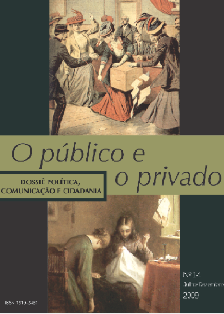When the television produces its proper politics of communication
An analysis of the Social Merchandizing in the Brazilian soap opera
Keywords:
policies Communication, television, merchandizing SocialAbstract
Public communication policies have, over time, tried to outline a series of regulatory frameworks, which in theory, seeks to fine-tune the media to the rights and demands of civil society. But as long as the power the public seeks to provide guidelines for the communication system, the media will building, in spite of public bodies, their own communication policies. Amid the open debate in civil society on education, participation and inclusion Brazilian television promotes policies that guide its programming in order to to raise it to the category of citizen company. One of the most important levers broadcasters to achieve this goal has been the introduction in their serial fiction of Social Merchandising (MS). This work, therefore, intends to analyze the MS presented in the soap opera Laços de Família (2000-2001), produced by Rede Globo Television, from the perspective of its audience. Such an approach is based on the fact that that communication policies can only be responsibly assessed based on concrete objects through which these policies acquire social visibilityDownloads
Published
2020-01-28
How to Cite
BARROS DE ANDRADE, R. M.; SILVA, E. H. When the television produces its proper politics of communication: An analysis of the Social Merchandizing in the Brazilian soap opera. O Público e o Privado, Fortaleza, v. 7, n. 14 jul.dez, p. 179–192, 2020. Disponível em: https://revistas.uece.br/index.php/opublicoeoprivado/article/view/2616. Acesso em: 17 feb. 2026.
Issue
Section
Temas Livres











